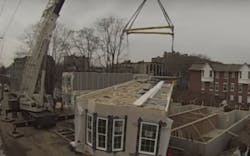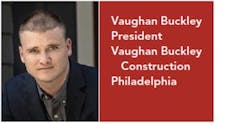Vaughan Buckley Sees Big Changes and More Prefab in Home Building by 2030
First, while still working at the hotel, he attended night school and earned his MBA. He then studied law, again during nights, at Temple University and passed the state bar exam at age 25. Between hotel employment and becoming an attorney, he started a construction company in 2009 that grew from $200,000 in annual revenue to more than $12 million by 2016. Beyond building modular single-family homes and multifamily buildings, Buckley’s company provides developers with services that include site planning, engineering, parcel zoning, and construction oversight, and it also acts as a liaison with municipal authorities and utility providers.
Today, Buckley is also one of four principals from two companies—Vaughan Buckley Construction [VBC] and Ritz-Craft, one of the largest, oldest family-owned modular factories in the U.S.—to launch Johns Buckley, a modular builder of commercial structures such as hotels, apartment buildings, and assisted living facilities, with five factories in three states.
Q: You recently went to Europe to visit modular construction companies. Where did you go and what did you see?
A: My vice president and I traveled to four countries in Europe and focused on Scandinavian technology. We saw factories that produce highly complicated building systems, with significantly higher performance than U.S.-constructed residential buildings, done with significantly more automation and surrounded by a culture of innovation and integrity. We met workers, factory owners, robotics experts, equipment manufacturing companies, builders, and developers, all of whom were dedicated, insightful, and well aware of the need for factory integration into construction technology. It was a wonderful experience that I will never forget.
Q: What was it that motivated you to take the trip?
A: Concern for the construction industry as a whole was our motivation. Skilled labor is currently harder to recruit, train, and retain than at any other point in history, and our workforce generation gap is going to create a massive hole in the master-level trades in the next decade. Our construction processes as a whole, from a site-built perspective, have always been inefficient, but in recent decades even our factory-built construction has become less efficient. Lack of technology and integrated communication, lack of innovation, and lack of support from other industries are all major problems. Add to that a lack of skilled labor, and construction is in for a major reckoning and disruption in the future.
Q: Have you applied any takeaways from your trip to your company?
A: We learned a lot in Europe. Potentially the biggest thing was that we are on the right track. To discover that we aren’t some crazy company with a harebrained idea trying to swim upstream in a tightly controlled niche of the construction industry was huge for us. We saw people who are truly passionate about their future and have ingrained that passion in their culture.
After coming home, we started to identify our own culture and to determine how it would propel us into the future. We created a brand identity separate from that of the owners, and we helped our team understand their place in the future vision. It worked.
During the last 12 months, we’ve quadrupled in size both in revenue and in employee count. We’ve hired more than a dozen new management staff in the last 90 days. We understand our place in the industry, we understand the challenges we face in getting where we want to go, and now we know not just how to get there but what we want to be when we grow up.
The world of construction is going to be vastly different by 2030, and we intend to be at the forefront of the evolution of the U.S. market.
Q: If pre-fabrication and other alternative construction methods to stick building gain traction, what other professions do you see possibly integrating into homebuilding?
A: Pre-fabrication is not a method originated or even perfected in off-site construction. In reality, construction in the U.S. probably does one of the worst jobs, globally speaking, at pre-fabricating components for use in residential buildings. It is also the most efficient method we currently have outside of building on site and dealing with the labor shortages and weather issues that creates.
In the next few years, our energy codes are going to drastically change, the quality and level of skill required to successfully build a home in the field literally is going to be that much more difficult to achieve. Factory construction is the obvious way to do that. Being able to centralize a skilled labor force is the easiest way to increase efficiency and volume and when you’re already suffering a labor issue and then add fuel to that fire in the form of increased complexity of product, manufacturing is the obvious choice. Builders think that construction is hard, which it is, and that building in a factory is complicated, which it is, but there are large companies out there that make builders in the U.S. look like tadpoles in a frog pond. There are companies in the world that have massive brand awareness and consumer trust levels, that understand manufacturing and that have market caps that make the Housing Giants combined market caps look small. If those companies start to move into the manufacturing market and I’m sure they’re already looking then we could expect some pretty major disruption. Our industry needs to innovate, integrate and evaluate everything we do and be prepared for the consequences if we don’t.
Q: What do you see as possibilities for how the U.S. construction industry could change?
A: Manufacturing in the construction industry is the future of the industry for so many reasons, mainly because it makes sense. Without introducing the advancements and success of the manufacturing industry to the construction industry we face insurmountable tasks of ensuring quality control, consistency and integrity that our customers and code councils will require in the coming years.
Q: You came into homebuilding from the hospitality industry. What parallels or managing techniques did you learn/use in the hotel industry that you applied to construction?
A: When I first got in to the construction industry, I was excited by the parallels between hotel management and construction. Hotels are very complex operations, where you’re managing the consumer-facing front of house services, multitudes of back of house services—one of my client refers to that as the “sausage making;" nobody wants to see how it’s made—and the seamless integration between the two. Customer service is paramount and quality and consistency of the back-end services being provided support the company’s success.
All while making seemingly incompatible divisions and crews work together as cogs in a wheel. Hotels are a unique industry where scheduling, diplomacy, coordination, big-picture vision, and minor detail analysis are all mandatory for success. I found the transition to be quite smooth—apart from the construction knowledge, of course, it took many years to get comfortable with codes and construction details.
Q: Is one reason you’re making inroads with Northwest developers for modular construction due to VBC also offering assistance with site plan engineering, zoning, and managing interactions with Philly’s licensing, inspections, and utilities? Would modular/pre-fab stand on its own if VBC didn’t offer these services?
A: Off-site construction’s biggest present challenge is the integration of the factory to the field. The factories often think of themselves as a supplier that the developer/builder has to manage as part of their construction coordination. This attitude has countless times resulted in a frustrated relationship between factories and the project team—especially on larger projects. Developers don’t know what they don’t know and they don’t like not knowing anything! That can make modular construction a risky proposition. Coordination concerns between architects, engineers, subcontractors and building inspectors cause major disconnects between owner expectations and the end product. Tying the factory together with the field integration is key to any modular project’s success. This is why our company has grown so fast and why we started a modular manufacturing entity earlier this year that operates out of five plants in three states [PA, MI, NC]. In order for the fieldwork to succeed, the owner must understand every element of the process that the factory construction affects and how—which in turn means the factory must know what goes on outside of their compound. In order to reduce the execution risk to a project team to an acceptable level, the factory must have a holistic understanding of the entire project, which is what we strive to do differently.
About the Author

Mike Beirne
Mike is the senior editor of Pro Builder and Custom Builder magazines. A two-time Jesse H. Neal Award winner, Mike has nearly 30 years of journalism experience plus numerous news and feature writing awards, including honors from the Society of Professional Journalists, the American Society of Business Press Editors, and the National Association of Real Estate Editors. He also operated a masonry restoration business for more than two decades. [email protected]


